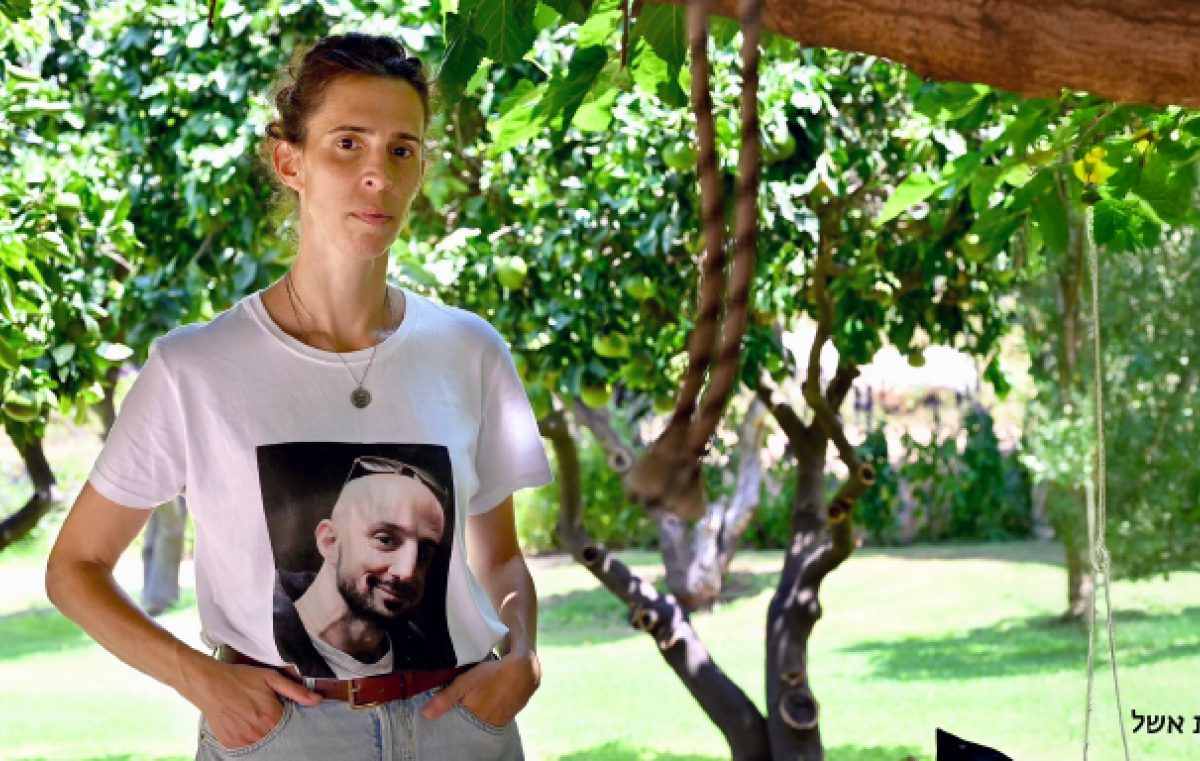“There Is Anger That Consumes, and There Is Anger That Propels”
Jenny Savidia, Nova survivor, will light a torch at Israel's 77th Independence Day ceremony for her work supporting survivors and bereaved families of the October 7 attacks.

"There is anger that consumes, and there is anger that propels. I chose to let my anger propel me," says Jenny Savidia, who survived the October 7 massacre at the Nova music festival but lost her brother Shlomi in the attack.
A social psychologist, former organizational consultant in the IDF, PhD student in Bar-Ilan University’s Gender Studies Program, and mother of two daughters, Savidia has dedicated recent months to serving as the content director at Makom Marpeh (A Healing Place) in Beit Yitzhak — a rehabilitation center for bereaved families and survivors of the October 7 tragedy.
For her work supporting survivors, she has been selected to light a torch at Israel's official Independence Day ceremony this year.
"A Healing Process for Myself, Too"
Savidia recalls that when the rocket attacks began at 6:30 AM on October 7, she was waiting in the parking lot of the Nova party, expecting the event to resume shortly.
"We thought it was just a standard Iron Dome event. We had no idea what was happening outside the festival grounds."
At 7:15 AM, Shlomi, worried for his children, left the area. Minutes later, gunfire erupted.
"When we realized terrorists had infiltrated the party, we tried to escape through the main exit. They started shooting at us, so we turned back, picking up others who were screaming for help. In the end, we packed 15 people into a seven-seat Citroën Kangoo."
They attempted to flee via the Re’im forest but encountered a terrorist checkpoint. Forced to abandon the vehicle, they fled on foot.
"It was pure luck who survived and who didn't. Bullets were whizzing past us. At one point, an RPG missile landed near us. We hid in a bush by the road, then escaped to an orchard where we hid under a tree with a few others. We stayed hidden for five hours, hearing the horrors happening along the main road. Terrorists entered the orchard multiple times and passed right by us without seeing us."
Throughout those harrowing hours, Jenny kept messaging her brother — until 9:12 AM, when he stopped responding.
"After five hours, we reached the main road, encountered police forces, and were taken to the Ofakim police station. There, I helped set up a situation room to try to locate Shlomi. I also — though I don’t remember this part — provided psychological first aid to others gathered there, encouraging them to tell their stories, because speaking about trauma immediately can lessen PTSD symptoms."
Around 5:30 PM, her phone battery died, and police officers urged her to evacuate. Jenny returned to her parents' home in Ganei Tikva, and later that night went to Lahav 433 to give testimony, provide DNA samples, and open a missing persons file for Shlomi.
"On October 13, at 11:30 PM, we received the dreaded knock on the door — they had identified his body. He was buried two days later. We weren't allowed to see the body. To this day, we don’t know exactly how or where he was murdered."
During the week that Shlomi was still officially missing, Jenny first visited Makom Marpeh. The center, founded by Ra'anan Arizon, offered her an opportunity: to channel her personal experience to enhance the center’s therapeutic offerings.
"We provide support circles to strengthen resilience and equip people with tools to navigate their new reality. I’m responsible for daily programming and resilience activities, working with an incredible team of therapists. I personally lead support groups for widows and for evacuees from Gaza border communities.
Because I lived through it myself, I can truly empathize — and survivors find it easier to connect with me. It took me a while to realize that this work was also deeply healing for me."
Giving Hope and Strength to Survivors
Beyond her work at Makom Marpeh, Savidia is also involved in civilian diplomacy through the "Faces of October 7" initiative — a private project founded by Dr. Halevi Feldman, raising funds to send soldiers, survivors, and bereaved families abroad to share their stories and testify to Hamas' atrocities.
Jenny has already been interviewed on CNN, spoken at the United Nations, met with the Governor of Atlanta, and plans to travel to Singapore later this year.
She also volunteers to assess the emotional readiness of participants before their international advocacy trips.
Meanwhile, Jenny is continuing her PhD under the supervision of Prof. Shira Offer. Her research focuses on how the skills and competencies we acquire as parents improve workplace performance.
"Before October 7, my doctorate was my whole world. I’m a Presidential Fellow. Since the attacks, my research has been on hold. I am profoundly grateful to my advisor, the Gender Studies department, and the university for their understanding and support — it has brought me great comfort."
In April 2025, Jenny Savidia was chosen to light a torch at Israel’s annual Independence Day ceremony on Mount Herzl.
Minister Miri Regev, responsible for the ceremony, said of her: "Jenny gives hope and strength to survivors, to bereaved families, and to those struggling to heal. Her personal story — surviving the Nova massacre and mourning her brother lost in the same attack — embodies resilience. Over the past year and a half, she has devoted all her energies to healing and recovery efforts, and she does so with inspiring success."